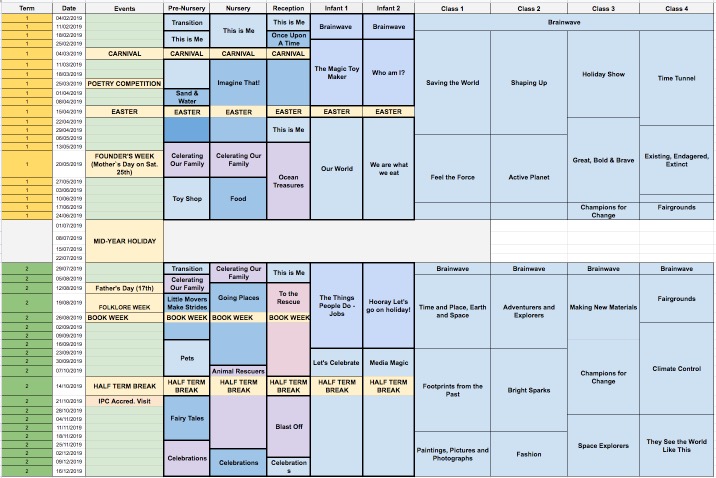

A Brief History of the IPC
Developed in the late 1990s by the consultancy, Fieldwork Education for Shell’s international schools worldwide, the International Primary Curriculum (IPC) quickly became popular with other schools looking for a curriculum that would be suitable for their diverse cohorts of international children. By using the IPC, international schools around the world have been able to deliver lessons according to a commonly agreed set of learning principles and objectives. There are now almost 2000 IPC schools across 90 countries.
What is the IPC?
Designed for children aged 5 to 11 years old, the IPC takes a thematic approach in which subjects are brought together under one topic. For example, younger students might study topics such as Food, Shopping or Transport, while older students might cover topics such as Celebrations, Climate Control or Space Explores. In total, there are currently about 130 of these topics, also known as ‘learning units’, to choose from – all of which are designed to appeal to children’s interests and help them to learn more about the world around them. Each learning unit then brings in learning goals from other subjects such as literacy, numeracy, science and history. Below is our IPC curriculum map for 2019, which shows all the topics students will study during this coming academic year:

The concept of theme-based learning is not new, as it first appeared in the 1970s. What the IPC has done, however, is to take this basic concept and modernise it to reflect findings from neuroscientists and other educationalists. An emphasis on how subject disciplines are interdependent allows students to see the connections between subjects and how they are linked to a big idea. In this way, the IPC is intended to provide both depth and breadth to students’ learning.
The ethos of IPC schools as ‘learning-focused’ is underpinned by findings from neuroscience, in terms of the reinforcement of existing neurons and the creation of new neurons. As a result, the IPC views learning as both a process of consolidating existing learning and, secondly, as the development of new learning.
The IPC’s learning outcomes are based on developing knowledge, skills and understanding - the differences between each need to be clearly communicated to the children, as shown in the display below. This is because a key feature of the IPC is its emphasis on the fact that knowledge is only valuable when it used to supplement skills and understanding for any given task.
The IPC reinforces a lifelong view of learning by viewing the development of knowledge, skills and understanding as ongoing throughout an individual’s lifetime. Key questions are used to prompt teachers to reflect, e.g. ‘What kinds of children are we trying to develop, and how can we prepare students for the 21st century?’
How is the IPC implemented?
The learning goals are the foundation on which the International Primary Curriculum is built. They set out clearly what children should learn at school: the big ideas, the qualities we want them to develop, the key skills and the essential knowledge.
The IPC provides students with subject goals, personal learning goals, and uniquely, international learning goals, and these are defined for each age phase:
– Milepost 1 (5 to 7 years)
– Milepost 2 (7 to 9 years)
– Milepost 3 (9 to 11 years)
The mileposts are one of the key organisational features of the IPC. The reason behind organising learning across a two or three-year age span is that if we are to help children to develop skills as well as knowledge and understanding, then we need to recognise that this takes time to learn.
Subject Goals
Subject goals cover the knowledge (facts and information students are expected to learn), skills (practical abilities students need to be able to exhibit) and understanding (deeper awareness of key concepts that develop over time) of children relating to the subjects they are learning. There are subject learning goals for Language Arts, Mathematics, Science, ICT & Computing, Technology, History, Geography, Music, Physical Education, Art and Society.
Personal Goals
Personal goals underpin the individual qualities and dispositions that the IPC believes children will find essential in the 21st century. There are 8 IPC Personal Goals – enquiry, resilience, morality, communication, thoughtfulness, cooperation, respect and adaptability. Opportunities to experience and practice these are built into the learning tasks within each unit of work.
International Learning Goals
From the perspective of the IPC, if we are to be serious about helping our learners to develop a mindset that will allow them to think and act globally, then we as a school need to be specific about what international-mindedness means and how it can be achieved. International learning goals are unique to the IPC and help young children begin the move towards an increasingly sophisticated national, international and intercultural perspective. This move can be thought of as a journey from ‘self’ to ‘other’. Each thematic IPC unit includes an international aspect, to help develop a sense of ‘international mindedness’.
The IPC Learning Process
Though vital, the learning goals only address what children should learn and not how they should learn. This is why there is a clear process of learning developed in the IPC, from Entry Point to Exit Point, which intends for children to become engaged, active and collaborative learners rather than just passive receivers of information. If structured as intended, each unit follows the same process of learning, in order to ensure that children’s learning experiences are as stimulating as possible:
Learning Targets > Entry point > Knowledge Harvest > Explaining the Theme > Research & Recording Tasks > Exit Point
The exit point finishes a unit. It helps students to think about what they have learnt and provides an opportunity to celebrate the learning that has taken place over the unit. We try to encourage parents to attend exit points to allow them to get further involved in their child’s learning. As much as possible, we also invite guest speakers from our community to give talks.